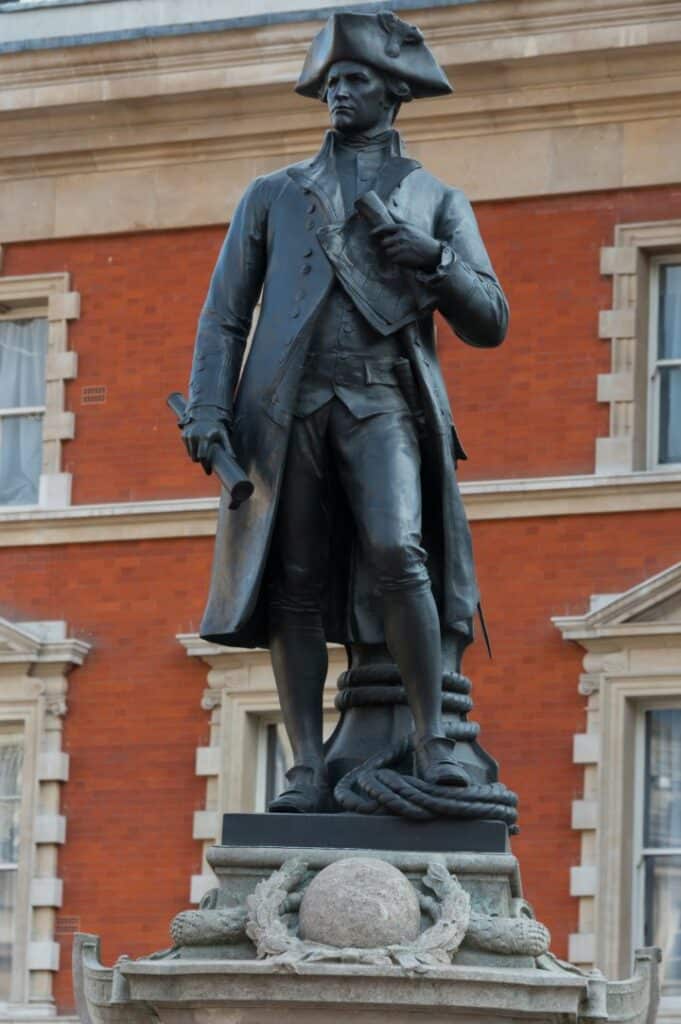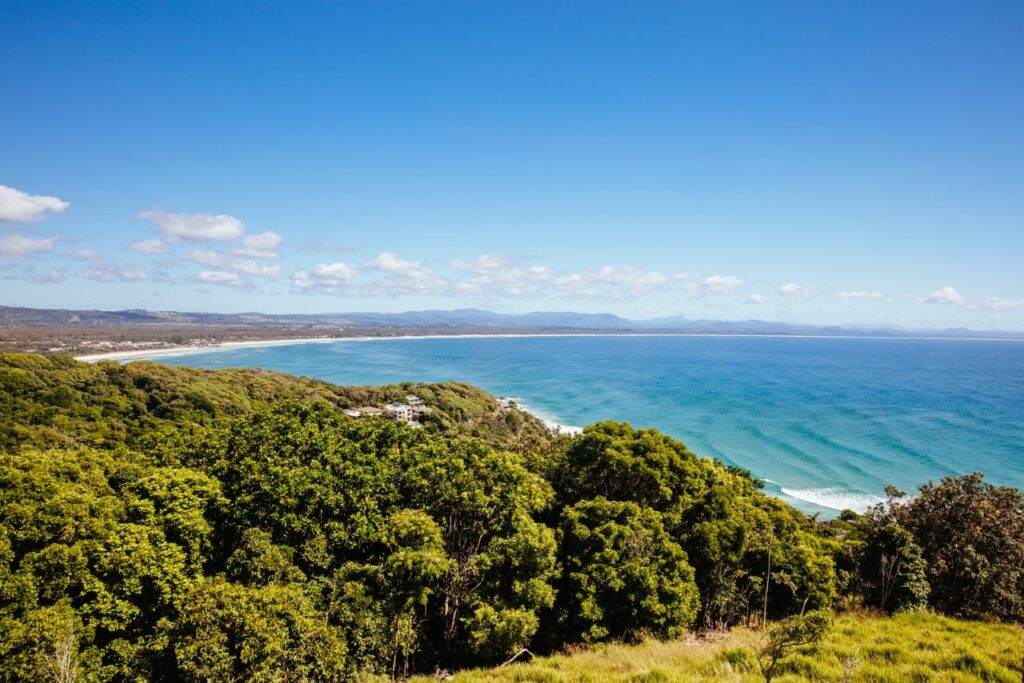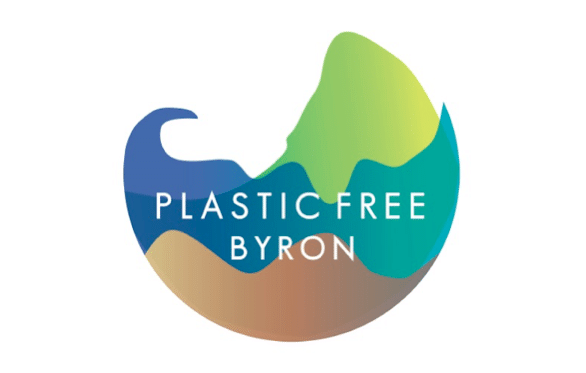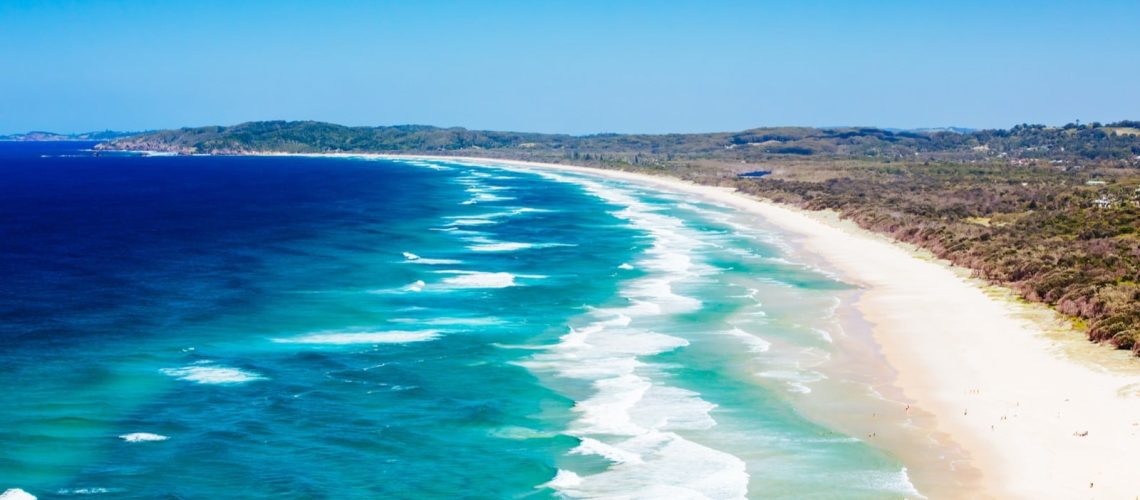Zen Plumbing are a plumbing company who has served the Byron Bay community for many years. We get asked all the time, how it got its name. Who was it named after?
Let’s answer that question for you right now.
Byron Bay is a coastal gem located on the eastern shores of Australia. However, the origins of its name are deeply rooted in the history of exploration and the maritime adventures of the 18th century.
In this article, we will outline the fascinating history of Byron Bay’s name, which pays homage to Captain James Cook’s voyages and Admiral John Byron, a notable figure in the British Royal Navy.
Captain James Cook’s Exploration

The story of Byron Bay’s name begins with the legendary British explorer, Captain James Cook. In 1770, during his first voyage to the South Pacific aboard the HMS Endeavour, Cook embarked on an exploration of the eastern coast of Australia. It was during this historic journey that he encountered the breathtaking bay that would later bear his chosen name.
Captain Cook’s exploration of the Australian east coast was a significant maritime achievement of the 18th century. He meticulously charted the previously uncharted coastline, providing invaluable maps and descriptions of the region. Cook’s meticulousness in mapping the area was driven by the need for accurate navigation and safe passage for future sailors.
Cook’s decision to name the bay after a fellow naval officer was a common practice of the time. He chose to name it Cape Byron, a name that would later extend to the bay itself. This naming practice served to honour his friend and cousin, Admiral John Byron, who, like Cook, was a distinguished officer in the Royal Navy.
Admiral John Byron
To truly understand why Byron Bay is called Byron Bay, it’s important to explore the life and accomplishments of Admiral John Byron. John Byron was born on November 8, 1723, and came from a family with a strong naval tradition. He was a cousin of James Cook, and their familial connection played a pivotal role in the naming of the bay.
Admiral John Byron had a distinguished career in the Royal Navy, earning his reputation as an accomplished officer and explorer. Notably, he circumnavigated the globe during his voyage on HMS Dolphin from 1764 to 1766. This remarkable journey took him to various parts of the world, including the South Pacific, where he encountered new lands and made important observations.
It was his naval achievements and the recognition of his contributions that led Captain James Cook to name the bay in his honour. The decision to name this coastal treasure Byron Bay was a fitting tribute to a man who had left his mark on the maritime world.
Naming Practices in Exploration
During the age of exploration, naming newly discovered places after notable figures was a common practice. Explorers and navigators often chose names that held personal or professional significance. This tradition served to immortalize individuals who had made significant contributions to exploration, science, or the arts.
By naming the bay after Admiral John Byron, Captain Cook followed in the footsteps of other explorers who had named landmarks after influential figures. It was a way to pay respect to fellow seafarers and to create a lasting legacy for those who had shaped the course of history through their voyages.
Byron Bay’s Geography and Attractions
Byron Bay is blessed with a geography that captivates the senses. Its coastline stretches along the azure waters of the Pacific Ocean, adorned with pristine beaches that seem to stretch on forever. The iconic Cape Byron, the easternmost point of mainland Australia, is crowned by the Cape Byron Lighthouse, offering breathtaking panoramic views of the surrounding ocean and hinterland.
The town’s lush hinterland, with its rolling hills and subtropical rainforests, provides a striking contrast to the coastal scenery. This unique blend of coastal and hinterland landscapes creates a haven for outdoor enthusiasts. Visitors can explore the diverse environments, whether it’s hiking in the rainforests, relaxing on the beaches, or whale watching from the Cape Byron headland.

Byron Bay’s attractions extend beyond its natural beauty. The town boasts a thriving arts and music scene, with numerous galleries, studios, and live music venues. The Byron Bay Markets showcase local crafts and artisanal products, reflecting the town’s creative spirit.
Byron Bay’s Cultural Significance
Byron Bay has earned its place as a cultural hub, attracting artists, musicians, and free spirits from around the world. Its cultural significance lies in its ability to foster creativity and self-expression. The town’s open-minded atmosphere encourages artistic endeavours, making it a haven for those seeking inspiration and freedom of expression.
Musicians, ranging from local talents to international stars, find a welcoming stage in Byron Bay. Music festivals like Bluesfest and Splendour in the Grass draw crowds of music enthusiasts, further solidifying the town’s cultural reputation.
Beyond music, Byron Bay’s rich cultural tapestry includes indigenous heritage, reflected in the art, stories, and traditions of the local Bundjalung people. Visitors can explore the Arakwal National Park to learn about the area’s indigenous history and cultural significance.
Tourism in Byron Bay
Tourism has played a pivotal role in shaping Byron Bay’s identity. The town’s magnetic appeal draws visitors from all corners of the globe. Its reputation as a surfing paradise, combined with its natural beauty and vibrant culture, makes it a must-visit destination.
The tourism industry in Byron Bay has evolved over the years, offering a range of experiences to cater to different interests. From eco-tourism initiatives that focus on preserving the environment to wellness retreats and yoga centres that promote holistic well-being, Byron Bay’s tourism sector continues to diversify.
While tourism has undoubtedly brought economic benefits to the region, it has also posed challenges related to sustainability and managing visitor numbers. Local initiatives and community efforts strive to strike a balance between preserving the town’s charm and accommodating the influx of tourists.
Byron Bay’s Enduring Appeal
The enduring appeal of Byron Bay can be attributed to its ability to capture the hearts of those who visit. It’s a place where time seems to slow down. And the stresses of modern life give way to relaxation and rejuvenation. Visitors are drawn to its pristine beaches, where the sound of crashing waves creates a soothing backdrop.
One of the key elements of Byron Bay’s charm is its unique lifestyle. The town fosters a sense of community and creativity. Making it a magnet for artists, musicians, and free spirits. The combination of natural beauty and cultural richness creates an atmosphere that encourages self-expression and a deeper connection with the world.
Byron Bay’s enduring appeal is also reflected in its commitment to environmental conservation. Efforts to protect the region’s natural treasures ensure that future generations can continue to enjoy its pristine landscapes.
Modern Developments in Byron Bay
While Byron Bay retains its timeless charm, it has also seen modern developments that have shaped its identity. The town’s popularity as a tourist destination has led to the growth of various industries, including hospitality, eco-tourism, and wellness retreats. These developments have provided economic opportunities for the local community.
However, modernization has also presented challenges. Managing the balance between preserving the town’s natural beauty and accommodating the influx of tourists has been an ongoing concern. Local initiatives and sustainable practices aim to address these challenges and maintain Byron Bay’s unique character.
One notable development is the growing focus on sustainability and environmental conservation. Byron Bay has become a hub for eco-conscious travellers, with initiatives such as plastic-free campaigns and wildlife preservation efforts.
What is Byron Bay’s Commitment to Environmental Conservation?
Byron Bay is dedicated to environmental conservation. The town’s stunning landscapes, pristine beaches, and lush hinterlands have inspired a strong sense of responsibility among its residents and visitors.

Byron Bay’s commitment to environmental conservation is evident in a range of initiatives aimed at preserving its natural treasures. The town has become a beacon for eco-conscious travellers and residents alike.
Plastic-Free Byron One notable effort is the “Plastic-Free Byron” campaign, which seeks to reduce single-use plastics in the community. Local businesses have embraced sustainable practices. Such as offering reusable alternatives and minimizing plastic packaging. This initiative has not only reduced environmental impact but also raised awareness about the importance of responsible consumption.
Wildlife Preservation Byron Bay is home to diverse wildlife, including sea turtles and coastal birds. Conservation efforts focus on protecting these species and their habitats. Sea turtle nesting sites are closely monitored. And educational programs educate the public about the importance of respecting nesting areas. Birdwatching is also a popular activity in the region, highlighting the town’s commitment to preserving its avian residents.
Sustainable Tourism The town promotes sustainable tourism practices that minimise the environmental footprint of visitors. Eco-friendly accommodations and tours that prioritise conservation. Along with responsible wildlife, encounters are encouraged. This approach ensures that tourism benefits the local economy without compromising the region’s natural beauty.
Cape Byron and Its Significance
Cape Byron, the easternmost point of mainland Australia, holds great significance, both geographically and culturally.
Geographical Significance Cape Byron is an iconic landmark that marks the eastern extremity of the Australian continent. Atop the cape stands the Cape Byron Lighthouse. Which has been guiding ships along the coast since its construction in the late 19th century. The lighthouse not only serves as a navigational aid but also offers panoramic views of the surrounding ocean and hinterland, making it a popular destination for visitors.
Cultural and Indigenous Significance The cape and its surroundings have cultural importance to the local Bundjalung people, who are the traditional custodians of the land. Indigenous heritage sites and stories are shared with visitors, providing insight into the region’s rich cultural history. Cape Byron is a place where visitors can connect with the land and learn about the indigenous communities that have called it home for thousands of years.
Conservation Efforts Cape Byron also plays a role in environmental conservation. The Cape Byron State Conservation Area encompasses the cape and its surroundings. Providing a protected habitat for native flora and fauna. Efforts are made to maintain the pristine condition of this area. While allowing visitors to appreciate its natural beauty responsibly.
Conclusion
Byron Bay, a coastal paradise on Australia’s eastern shores, derives its name from a rich tapestry of history, exploration, and cultural significance. Captain James Cook’s voyages led to the naming of the bay after his friend and fellow naval officer, Admiral John Byron. This tradition of naming places after notable figures reflects the era of exploration.
Byron Bay’s enduring appeal is rooted in its stunning geography, cultural significance, and commitment to environmental conservation. The iconic Cape Byron, marking the easternmost point of mainland Australia, adds a unique layer of geographical and cultural significance to this beloved destination.
Byron Bay is more than just a name; it’s a story of exploration, heritage, and a timeless connection to the natural world.
Contact Zen Plumbing
Call us today at Zen Plumbing to schedule a quote. Andy will discuss your needs and talk you through different options. We will then provide a written fixed-price quote.
Phone: 0420 797 619 or send us a message [email protected]


